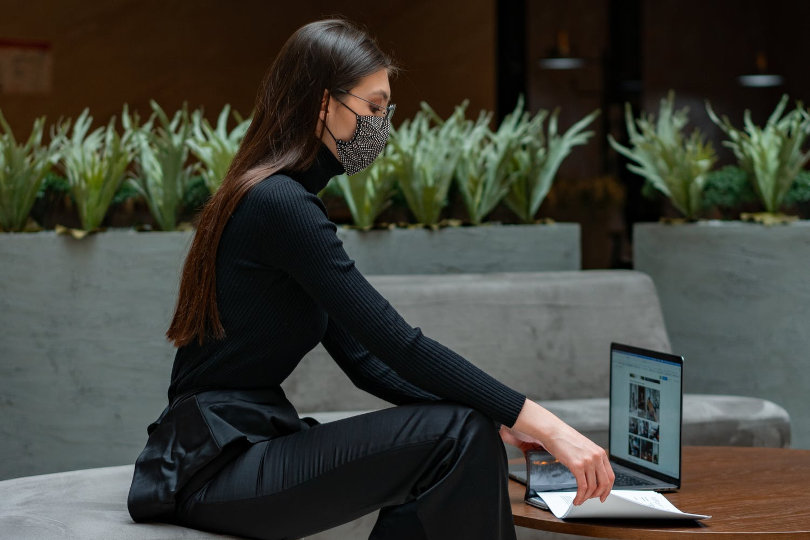COVID-19 has left a huge impact on our mindset and on the concept of what we thought about office spaces, twisting the idea of rigid office spaces to work from home revolution. And now since the abundance of COVID-19 vaccination, many employers will return to their previous working routines, however, many individuals are resisting returning to long office working hours and prefer to work from home while enjoying the convenience and amenities of their private space.
This is not without reason. When all the pandemic started, it was very difficult for employees and employers to shift to a whole new dynamic of working from home. Now nearly two years down the road, it has become the norm. Shifting back to pre COVID work style is turning out to be difficult than easy.

This resistance is urging the corporate sector to come up with a new and modified back-to-office mode for their employees. The most suitable option would be “hotelizing” the office, which is a combination of amenities found in hotels and homes into the office space.
What is Hotelization of an Office?
To understand the hotelization of office space, we have to take the example of a grand hotel lobby, furnished with couches, coffee tables, and top-notch decor. On top of this, classy floors give extra luxury and premium aesthetics to the space. Add all of this to office space and you will get what the hotelization of an office seems like. These hotelized offices have defined spaces to offer privacy to workers offering them the essential social distancing in the post-COVID world.
Such offices include comfortable furniture and provide well-managed locations for meetings, helping employees to have that relaxed feeling at work. Moving on to other amenities that a hotel offers, including fitness facility, salon, and rooms with attached bathrooms, kitchens, and dining area.
These features help the cooperate sector in many ways such as saving their time and effort and more importantly their money. Workers have the freedom to enjoy any luxury at the office and have a relaxing work session and even after work. The kitchen offers the opportunity to cook their desired meals and avoid spending money out on dining.
The cost-savings and convenience feature of these hotelized offices is a significant factor in attracting many clients and new employees along with potential tenants to keep their business running.
Why Hotelization is Trending?
This trend originated back in Chicago in United States at the turn of the century and the concept quickly gained popularity there. Over time, it made its way to other regions and now has become a global phenomenon, boosted especially with the return of normal office activities now that the pandemic is largely under control. Since the last 2 decades, the business has boosted with increasing popularity in corporate environments.
The corporate sector is now focusing on a more flexible module for their employees and businesses to avoid spending unnecessary money and time on ineffective ways to start the post-COVID-19 office journey. There are other two most important reasons why businesses are now opting for hotelized offices.
1. The Demand for Shorter Leases
Most of the companies are looking for short-term leases, which gives building owners the opportunity of being financially feasible to get their profits from potential tenants. This keeps on attracting companies to spend less money on long-term leases. Besides choosing short leases, these offices offer the same amenities for all lessees.
2. Prestigious Office Locations
These hotelized offices offer prestigious locations for businesses selecting office space by leasing properties close to desired amenities. Such locations have a variety of restaurants, service businesses, and fitness centers nearby along with providing a vast area for parking or public transportation.

What Does Hotelization Offer?
1. Financial Savings
The first and foremost advantage of office hoteling is saving money. Because in such working mode, employees are not bonded to a specific workspace or they don’t have to spend hours in the office daily, this gives companies the advantage for headcount growth without simultaneously needing to invest in more office space.
2. Office Resources
Office hoteling enables companies to enjoy all the office resources for their permanent and visiting employees. This not only decrease the expense of unnecessary resource expenses in-office hoteling environments but also enable administration teams to stop spending on differnet office consumables costs like printer paper and stationery
3. Employee Empowerment
Apart from the financial and spatial benefits of office hoteling, the organization and its employees are offered a flexible work environment that not only lowers travel expenses but also plays a vital role in increasing their productivity and morale. Office hoteling, provide space without entangling employees with the rigorous daily requirement of attendance and promotes employee empowerment.
4. Productivity & Collaboration
To increase creativity, employees may be provided with spaces that promote increased collaboration, and office hoteling has the benefit of flexibility which comes with furnished conference rooms and workstations available at demand. This boosts the morale of employees and encourages them to collaborate with ease. On top of this, it provides a private creative space for employees who are willing to have a quiet and seclusion time to focus on their tasks and projects.
5. Mobility
Office hoteling provides employees the ability to work globally, while accessing the resources they need, without being tied to a particular city or area. Office hoteling makes it easy for workers to book a desk or workspace in the office nearest to them.

Conclusion
Office hoteling is a potential ray of hope for many companies and their employees to start their post-COVID-19 back-to-office journey with a relaxed and desired environment. However, the individual needs will always vary but it is suspected that with the hotelization of offices many employee concerns and the company’s finances will be settled because of short lease options and availability of prime locations.




